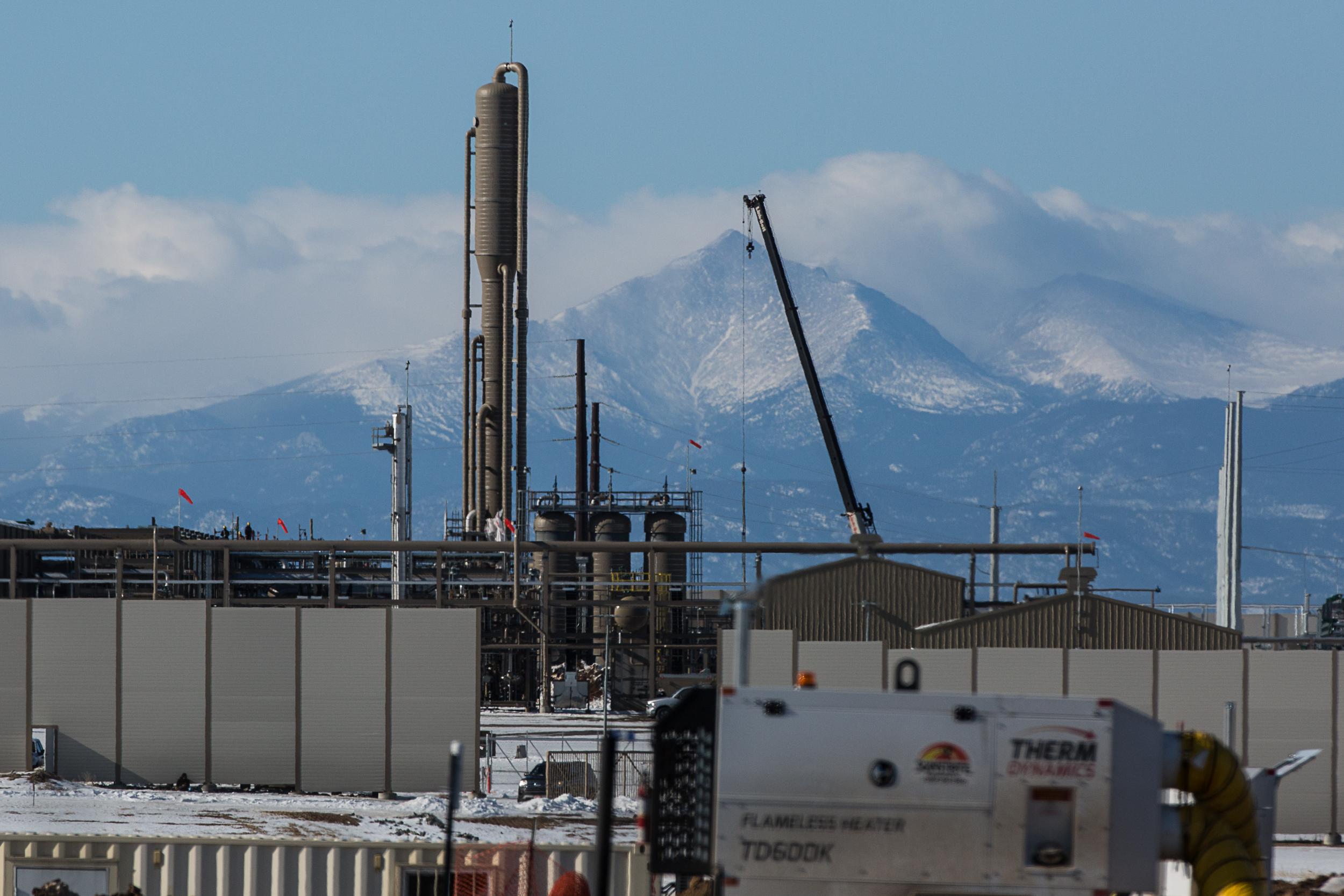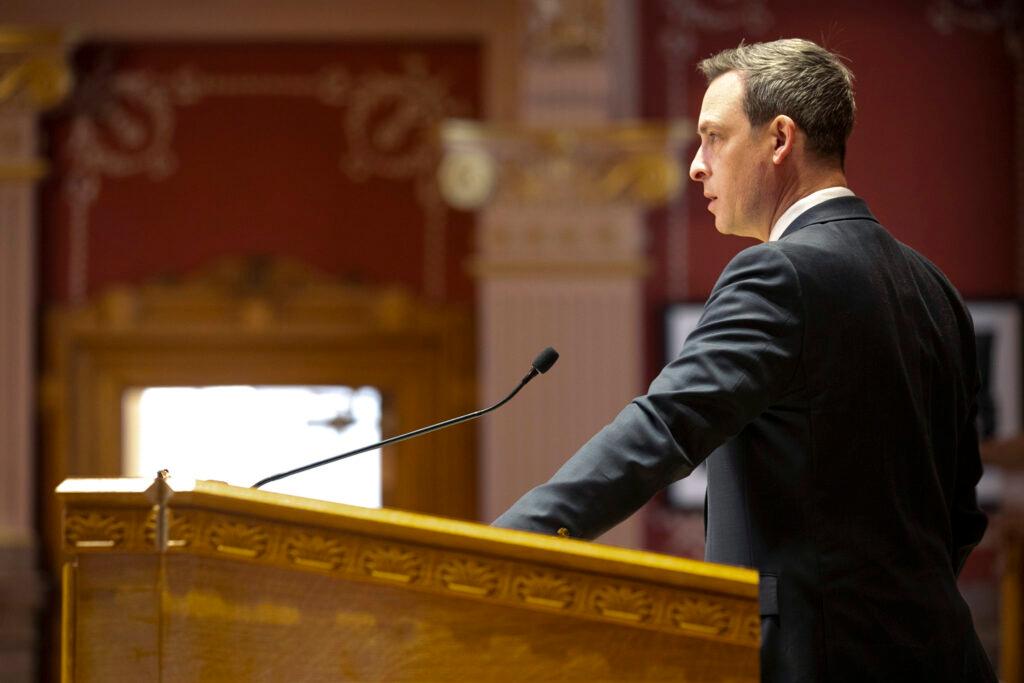
It’s an open secret among supporters of a bill to phase out new oil and gas development in Colorado by 2030: The proposal is unlikely to survive the legislative process in its current form.
Democratic lawmakers and climate advocates behind the plan are pushing ahead anyway to spark a debate about the state’s fossil fuel industry. In particular, backers want to publicly question if Colorado can claim it’s a climate leader without a plan to ramp down production of the primary energy source behind the rapid rise in global temperatures.
“We know we can’t keep drilling forever,” state Sen. Sonaya Jaquez Lewis, a sponsor and a Democrat representing Boulder County told supporters at a recent rally at the state Capitol. “This bill is the necessary step to ensure that Colorado is truly committed to a clean, sustainable energy future.”
If approved, the legislation would mark the first time a top-five oil-producing state has set an expiration date on new drilling. It would cap the total number of drilling permits regulators could issue in the two years leading up to 2030, at which point the state would stop granting oil and gas companies the right to develop new wells or deepen existing ones.
It’s a plan oil and gas industry leaders warn will ravage Colorado’s economy. Top fossil fuel trade groups have held press conferences and launched TV ad campaigns calling on lawmakers to kill the legislation, saying it would undo years of work to comply with state environmental protections. By meeting those standards, the industry said it can produce the cleanest oil and gas possible to meet ongoing fossil fuel demand.
The proposal, however, is likely to die without significant changes due to less fervent opponents: statehouse Democrats and Gov. Jared Polis. And its demise may have been a foregone conclusion the moment lawmakers introduced the plan in February.
Why the plan isn’t likely to move forward in its current form
The legislation faces its first official vote next week in the state Senate Agriculture and Natural Resources Committee. The panel has four Democratic lawmakers and three Republicans, which means the bill sponsors can’t afford to lose a single vote from their own party.
One crucial Democrat has already expressed deep reservations. State Sen. Dylan Roberts, a Democrat who represents parts of Eagle County and Routt County, chairs the committee. While he agrees the state should accelerate its efforts to control climate change and poor air quality, he opposes any policy to cap future oil and gas permits.
“The hard cutoff of permits could have significant economic consequences and risks jeopardizing school funding. The sponsors have told me they are working on amendments, so I'm waiting to see those,” Roberts said.
Roberts’ skepticism has led some supporters to question why state Sen. President Steve Fenberg assigned the proposal to his committee in the first place. Fenberg, a Boulder Democrat, addressed the issue in a video meeting with constituents in February, saying the bill’s sponsors always saw the legislation as a “messaging bill” and “didn’t intend” to pass it.
“The sponsors did not make a request for it going elsewhere this year,” Fenberg told constituents.

That’s not true according to State Sen. Kevin Priola, D-Henderson, and another one of the sponsors behind the proposal. While he acknowledged the plan is a “bold” proposal, he says no one ever told Senate leadership it wasn’t intended to pass. At the same time, Priola said he’s working on amendments — which he would not detail to CPR News — to give the legislation a chance of surviving its first committee vote.
But even with significant changes, the legislation could have a difficult time winning a signature from Polis.
The governor’s administration recently published a new greenhouse gas roadmap to guide Colorado’s next set of climate policies. The document explicitly rejects the idea of cutting emissions by slowing new oil and gas development, saying the approach could increase consumer costs and export pollution to other regions outside the state.
The roadmap’s authors note that “fundamentally, our strategy to reduce greenhouse gas emissions is to make clean energy cheap, rather than make fossil fuels expensive.”
A bigger disagreement over the best tools to fight climate change
Behind the legislative push is a shift in the international debate around global warming.
Around the world, most policymakers have focused on slashing climate-warming emissions by cutting demand for fossil fuels. Those strategies include policies to support clean alternatives — such as electric car rebates — or policies like carbon taxes or cap-and-trade markets to increase the price of traditional energy sources.
Those so-called “demand-side” policies have recently gained traction in Colorado and across the United States. The Inflation Reduction Act, the signature climate and healthcare law signed by President Biden in 2022, is flush with billions of dollars in incentives to accelerate a transition to a clean energy economy. Polis has further committed to a carrots-over-sticks approach to climate change, signing laws to give residents steep discounts on everything from electric cars to e-bikes to heat pumps.
Meanwhile, climate scientists are alarmed that humanity isn’t moving on from carbon-based energy. A report published by the United Nations last year found global governments still plan to produce more than double the amount of fossil fuels in 2030 than what would be consistent with limiting global warming to 1.5 degrees Celsius — a threshold set to avoid the most extreme and irreversible consequences of climate change.
Mark Paul, an assistant professor who studies climate economics at Rutgers University, told CPR News that the situation reveals the limits of only cutting fossil fuel demand. The U.S. remains the world’s top producer of oil and gas. Even if the country weans itself from carbon-based energy, other countries will continue to burn the fossil fuels it produces. A complementary supply-side strategy, Paul said, could help guarantee global reductions in climate pollution.
“If we don't stop extracting fossil fuels, then we're really tying one hand behind our back in this fight, and we're going to fail at the job that's in front of us,” Paul said.
While Paul recognizes Colorado represents a small portion of global fossil fuel extraction, he said the state could set an example for other governments around the world, especially if it can manage to wind down new drilling without tanking its economy.
Priola, the bill sponsor, says his goal was always to start a discussion about a supply-side approach. In the next few decades, he said the threat of ongoing fossil fuel development will become clearer to policymakers and the broader public.
“The proposal we’re putting forward now will seem very intelligent and thoughtful,” he said.
- To improve Colorado air quality, state Democrats propose overhaul targeting pollution from Suncor, oil and gas
- A lobbying frenzy builds around air pollution legislation focused on reducing summer smog
- Colorado is set to consider a ‘fossil fuel phase-out.’ Here’s why that’s a big deal
- Why a new air quality bill is the latest in rift between Gov. Polis and environmental justice groups









